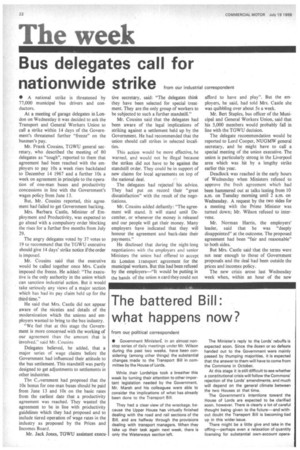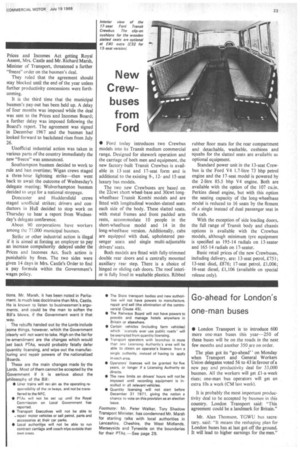The battered Bill: what happens now?
Page 24

Page 25

If you've noticed an error in this article please click here to report it so we can fix it.
from our political correspondent
• Government Ministers, in an almost nonstop series of daily meetings under Mr. Wilson during the past two weeks, have been considering (among other things) the substantial changes made to the Transport Bill in cornmittee by the House of Lords.
While their Lordships took a breather this week by turning their attention to other important legislation needed by the Government, Mr. Marsh and his colleagues were able to consider the implications of what has already been done to the Transport Bill.
They had a clear view of the wreckage, because the Upper House has virtually finished dealing with the road and rail sections of the Bill, and are halfway through the provisions dealing with transport managers. When they take up their task again next week, there is only the Waterways section left.
The Minister's reply to the Lords' rebuffs is expected soon. Since the dozen or so defeats handed out to the Government were mainly passed by thumping majorities, it is expected that the answer to them will have to come from the Commons in October.
At this stage it is still difficult to see whether a constitutional crisis will follow the Commons' rejection of the Lords' amendments, and much will depend on the general climate between the two Houses at that time.
The Government's intentions toward the House of Lords are expected to be clarified soon, however. There is clearly a lot of careful thought being given to the future—and without doubt the Transport Bill is becoming tied up in this wider issue.
There might be a little give and take in the offing—perhaps even a relaxation of quantity licensing for substantial own-account opera tions. Mr. Marsh, it has been noted in Parliament, is much less doctrinaire than Mrs. Castle.
He is known to listen to businessmen's arguments, and could be the man to soften the Bill's blows, if the Government want it that way.
The rebuffs handed out by the Lords include some things, however, which the Government clearly will not want to take. High on the list for
re-amendment are the changes which would set back PTAs, would probably fatally defer quantity licensing, and wipe out the manufacturing and repair powers of the nationalized Boards.
These are the main changes made by the Lords. Most of them cannot be accepted by the Government if it is serious about the philosophy of the Bill : • Liner trains will rer;sin as the operating responsibility of the ra 'ways, and not be transferred to the NFC.
• PTAs will not be set up until the Royal Commission on Local Government has reported.
• Transport Executives will not be able to . repair motor vehicles or sell petrol, parts and accessories at their car parks.
• Local authorities will not be able to run contract carriage and coach trips outside their own areas. • The State transport bodies and new authorities will not have powers to manufacture. repair and sell (the elimination of the controversial Clause 451.
• The Railways Board will not have powers to provide and manage hotels anywhere in Britain or elsewhere.
• Certain vehicles (including farm vehicles) which "scarcely ever use public roadswill be exempted from quantity licensing.
• Transport operators with branches in more than one Licensing Authority's area will be able to obtain an operator's licence from a single authority, instead of having to apply in each area.
• Operators licences will be granted for five years, or longer if a Licensing Authority so directs.
• The new limits on drivers' hours will not be imposed until recording equipment is installed in all relevant vehicles.
• Quantity licensing will not start before December 31 1971, giving the nation a chance to vote on this provision as an election issue.
Footnote: Mr. Peter Walker, Tory Shadow Transport Minister, has condemned Mr. Marsh for starting talks with local authorities in Lancashire, Cheshire, the West Midlands, Merseyside and Tyneside on the boundaries for their PTAs.—See page 29.




















































































































